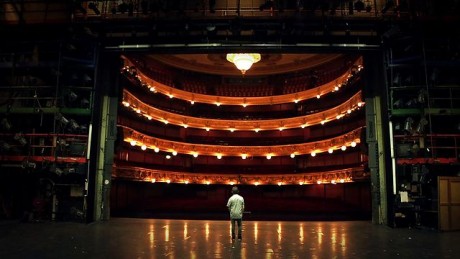Det danske Filminstitut præsenterer under FOLKEMØDET på Bornholm, stolt som det hedder og her er der virkelig grund til det, sammen med Politiken et meget fornemt program i FOLKEBIO i Allinge. Torsdag, fredag og lørdag 16. – 18. juni. I alt 10 film vises og diskuteres, tales sammen om eller forsynes med Q&A. 5 af dem har vi skrevet om her på Filmkommentaren, dem vil vi som en hilsen og ønske om gode visninger til Folkebio så lige fremhæve her:
TORSDAG
15:00 Fredrik Gertten og Magnus Gertten: Den unge Zlatan, SE 2015, 100 min.

… For a football fanatic the film is gold. You see where he comes from, you have interviews with him, you get a sense of (with Ajax manager Leo Beenhakker’s words) his conflicted nature, you see him being aggressive and violent in matches, you see him score goals and get booed by the audience when he does not, it’s all so very well composed going back and forth in time, there is a kind of melancholic tone in the film that is also about a young player on the top, who is a very private person at the same time as he through growing up learns how to behave, or does he? Læs mere
17:30 Sine Skibsholt: Dem vi var, DK 2016, 90 min.

… Dem vi var er som socialrealistisk skildring i min læsning mere end en særlig fortælling om en hjerneskades indvirkning på et kærlighedsforhold.
Den er som en første begyndelse til en meget nutidig filmisk undersøgelse af ægteskabets, samlivets, , samlivets, forelskelsens, erotikkens, altså kærlighedens almindelige forvandlingsformer i moderne tid. Sådan tager jeg den i hvert fald til mig, og det gør ondt at se den film… Læs hele anmeldelsen
20:00 Tom Hooper: Den danske pige, US, UK, BE 2015, 119 min.
FREDAG
11:30 Christian Sønderby Jepsen: Naturens uorden, DK 2015, 97 min.

… Åbningsbilledet er præcist og smukt. Jacob Nossell står rygvendt til kameraet på den tomme scene i Det Kongelige Teater og kigger ud i den oplyste, tomme teatersal hvor han og jeg hører det publikum som han filmen igennem vil arbejde på at blive i stand til at møde. Han og jeg hører publikum klappe. Hans første replik lyder: ”Hej! Mit navn er Jacob. Når folk møder mig for første gang, så får de en instinktiv impuls til enten at flygte fra mig eller også slå mig ihjel. Så vi skal nok få en rigtig hyggelig aften i aften.” Musikken sætter ind, det er filmmusik til en stor film. Ingen tvivl om det, jeg er tryg… Læs mere
14:30 Mads Ellesøe: Børnesoldatens nye job, DK 2016, 68 min.

… Ellesøe og klipperne Bodil Kjærhauge og Steen Johannesen bygger i en neddæmpet, nøgtern, alvorlig stil deres konstruktion på fire elementer: interviews, erindringsstof i korte fortællinger, nye reportageoptagelser, og et omfattende arkivstof, især fra tv. Altså som man ofte eller oftest gør i sådanne journalistiske fremlæggelser beregnet for tv, men vel at mærke her med en story-line, som ikke bygger på en opklaringens spænding, men mere på en journalistisk undersøgelses vidnesbyrd på vidnesbyrd: interviews med en række nøglepersoner, tidligere medarbejdere i de undersøgte private defence services (de private hære), efterretningsfolk og undersøgende journalister, interviews med både aktive og tidligere soldater, som begyndte som helt små drenge. Læs mere
16:30 Christian Holten Bonke: Ejersbo, DK 2015, 75 min.

… En særlig vægt og aura har interviewet med forlagsredaktøren Johannes Riis, optagelser som bliver en beretning helt for sig selv, en indlevet rapport om selve det litterære arbejde og kun det. Et element som distanceret faglig og indlevet digterisk findes centralt i filmens konstruktion, og det peger da også direkte mod filmens kerne: det store berømte romanværk og der særligt Afrika trilogien. Riis’ redegørelse er i sammenhængen et umisteligt element, det forekommer i og for sig alene en film, en tv-dokumentar værd. Læs hele anmeldelsen
19:00 Tobias Lindholm: Krigen, DK 2015, 115 min.
LØRDAG
11:30 Phie Ambo: Songs from the Soil, DK 2015, 38 min.
13:30 Jacob Gottschau: Facebookistan, DK 2015, 59 min.
15:30 Andreas Johnsen: Bugs, DK 2016, 73 min.
UDFØRLIGT PROGRAM:
http://www.dfi.dk/Nyheder/FILMupdate/2016/Juni/FolkeBio-2016.aspx







